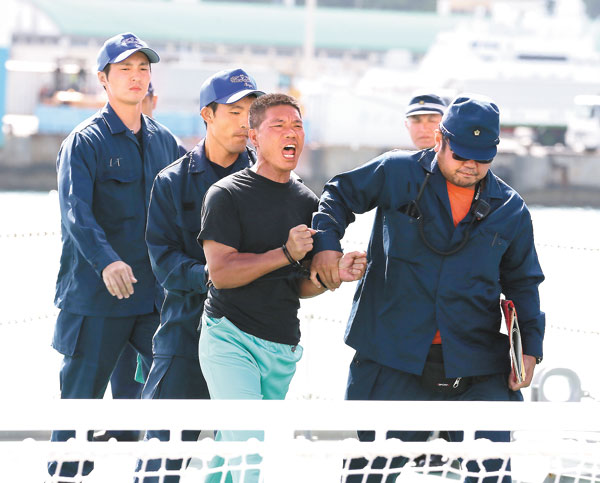Tokyo set to release detained activists
Updated: 2012-08-17 02:15
By Zhou Wa and Wang Chenyan (China Daily)
|
||||||||
Cooling tension over islands is best option for Japan, experts say
Japan will return 14 activists who were illegally detained after landing on an island belonging to China, according to Chinese diplomats in Japan.
China on Thursday again urged Japan to immediately and unconditionally release the activists.
 |
|
An activist who landed on the Diaoyu Islands is taken into police custody in Naha, the capital of Okinawa, on Thursday. JIJI PRESS / Agence France-Presse |
Cooling tensions over the Diaoyu Islands was the correct move for Tokyo, experts said, because Japan does not have the right to detain Chinese nationals on Chinese sovereign territory and acts of provocation will only harm Japan's interests.
All the 14 activists will be returned to Hong Kong no later than Friday, China Central Television quoted an unnamed Chinese diplomat as saying. The Japanese government has decided not to transfer the 14 Chinese activists to prosecutors, Japanese newspaper Asahi Shimbun reported. The activists landed on the islands on Wednesday after sailing from Hong Kong.
Meanwhile, during a phone call to his Japanese counterpart Kenichiro Sasae on Thursday, Vice-Minister of Foreign Affairs Zhang Zhijun asked the Japanese authorities to ensure the personal safety, dignity and fundamental rights of the activists.
According to the Foreign Ministry, a working group from the Chinese embassy and consulates in Japan arrived in Naha, the capital of Okinawa, where the activists are being held.
They visited the activists and lodged representations with the Japanese.
Japan has behaved differently in similar cases involving the islands.
In 2004, the government of former Japanese prime minister Junichiro Koizumi returned activists directly back to China, thereby avoiding any escalation in tension.
However, in 2010, Japan proposed transferring a Chinese trawler captain to prosecutors after he was detained in waters near the Diaoyu Islands.
This triggered a sharp response from Beijing. Japan eventually released the captain.
"Tokyo has behaved rather moderately this time," said Zhou Yongsheng, an expert on Japanese studies at China Foreign Affairs University.
But it should be made clear "Japan is not entitled to arrest or repatriate Chinese nationals under the cover of its domestic law" as the Diaoyu Islands, and its waters, are an inherent part of Chinese territory, Zhou said.
It was clear that Tokyo would not let Wednesday's landing escalate into a fully-fledged diplomatic incident because of lessons learnt in 2010, Zhou said.
The price would have been high if Tokyo copied its 2010 behavior, Zhou said.
Japan has initiated a series of disputes centering on the islands since the beginning of this year, Li Wei, director of the Institute of Japanese Studies at the Chinese Academy of Social Sciences, said.
Li emphasized that the Japanese government should reflect on the situation before taking any further measures.
Meanwhile, residents in Okinawa Prefecture and sections of the media in Japan were demanding a cool approach.
"It is of the utmost importance for us to fish in safe waters," Kameichi Uehara, 50, from the Yaeyama Fisheries Cooperative Association, told Asahi Shimbun.
An editorial in the Nikkei Shimbun warned that unpopular political leaders should not gamble with diplomatic relations to improve their image.
All of the 14 Chinese activists arrived on Thursday in Naha, China Central Television reported.
The Hong Kong SAR government and its representative office in Tokyo also sent officials to join the working group from the embassy and consulates to visit the activists and lodged representations with the Japanese.
Director-General of the Asian and Oceanian Affairs Bureau of the Japanese Foreign Ministry Shinsuke Sugiyama canceled a visit to China on Thursday, Phoenix TV reported on Thursday morning.
Sugiyama planned to visit Beijing to discuss details on a Tokyo-Pyongyang meeting to be held on Aug 29 in Beijing, but he canceled the trip because of the landing, Phoenix TV said.
Japanese Foreign Ministry officials said the cancellation was in protest against the landing, according to Japanese media.
Contact the writers at zhouwa@chinadaily.com.cn and wangchenyan@chinadaily.com.cn

 Relief reaches isolated village
Relief reaches isolated village
 Rainfall poses new threats to quake-hit region
Rainfall poses new threats to quake-hit region
 Funerals begin for Boston bombing victims
Funerals begin for Boston bombing victims
 Quake takeaway from China's Air Force
Quake takeaway from China's Air Force
 Obama celebrates young inventors at science fair
Obama celebrates young inventors at science fair
 Earth Day marked around the world
Earth Day marked around the world
 Volunteer team helping students find sense of normalcy
Volunteer team helping students find sense of normalcy
 Ethnic groups quick to join rescue efforts
Ethnic groups quick to join rescue efforts
Most Viewed
Editor's Picks

|

|

|

|

|

|
Today's Top News
Health new priority for quake zone
Xi meets US top military officer
Japan's boats driven out of Diaoyu
China mulls online shopping legislation
Bird flu death toll rises to 22
Putin appoints new ambassador to China
Japanese ships blocked from Diaoyu Islands
Inspired by Guan, more Chinese pick up golf
US Weekly

|

|







